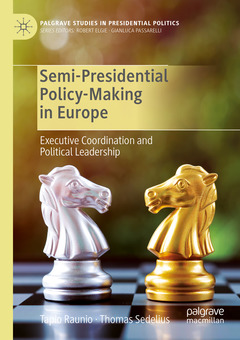Semi-Presidential Policy-Making in Europe, 1st ed. 2020 Executive Coordination and Political Leadership Palgrave Studies in Presidential Politics Series
Auteurs : Raunio Tapio, Sedelius Thomas

Tapio Raunio is Professor of Political Science at Tampere University, Finland. His research interests include legislatures and political parties, the Europeanization of domestic politics, semi-presidentialism, and the Finnish political system. He has published articles in many leading journals, including European Journal of Political Research, Journal of Common Market Studies, Party Politics, Scandinavian Political Studies, and West European Politics. He is a Steering Committee Member of the ECPR Standing Group on Presidential Politics.
Thomas Sedelius is Professor of Political Science at Dalarna University, Sweden. His research focuses on political institutions in new democracies and transitional regimes. His previous work on semi-presidentialism has appeared in leading journals such as British Journal of Political Science, Democratization, and Government and Opposition. In 2015, his article with Olga Mashtaler “Two Decades of Semi-Presidentialism” received the East European Politics Prize. He is a Steering Committee Member of the ECPR Standing Group on Presidential Politics.
Examines how leadership in foreign and EU policies work in the three semi-presidential regimes
Emphasizes the role of institutions without neglecting other variables such as party system dynamics or the broader political culture
Contributes to literature on semi-presidential regimes, presidents, and policy-making
Date de parution : 08-2020
Ouvrage de 169 p.
14.8x21 cm
Disponible chez l'éditeur (délai d'approvisionnement : 15 jours).
Prix indicatif 84,39 €
Ajouter au panierDate de parution : 05-2019
Ouvrage de 169 p.
14.8x21 cm
Disponible chez l'éditeur (délai d'approvisionnement : 15 jours).
Prix indicatif 84,39 €
Ajouter au panierThème de Semi-Presidential Policy-Making in Europe :
Mots-clés :
semi-presidentialism; institutional coordination; Finland; Lithuania; Romania; public administration; political leadership; foreign policy analysis; intra-executive conflict; public opinion; formal intra-executive coordination; administrative coordination; formal institutions; agenda-setting initiatives; presidential activism; security policy; EU affairs; policy failure; coordination failure; presidential activism



